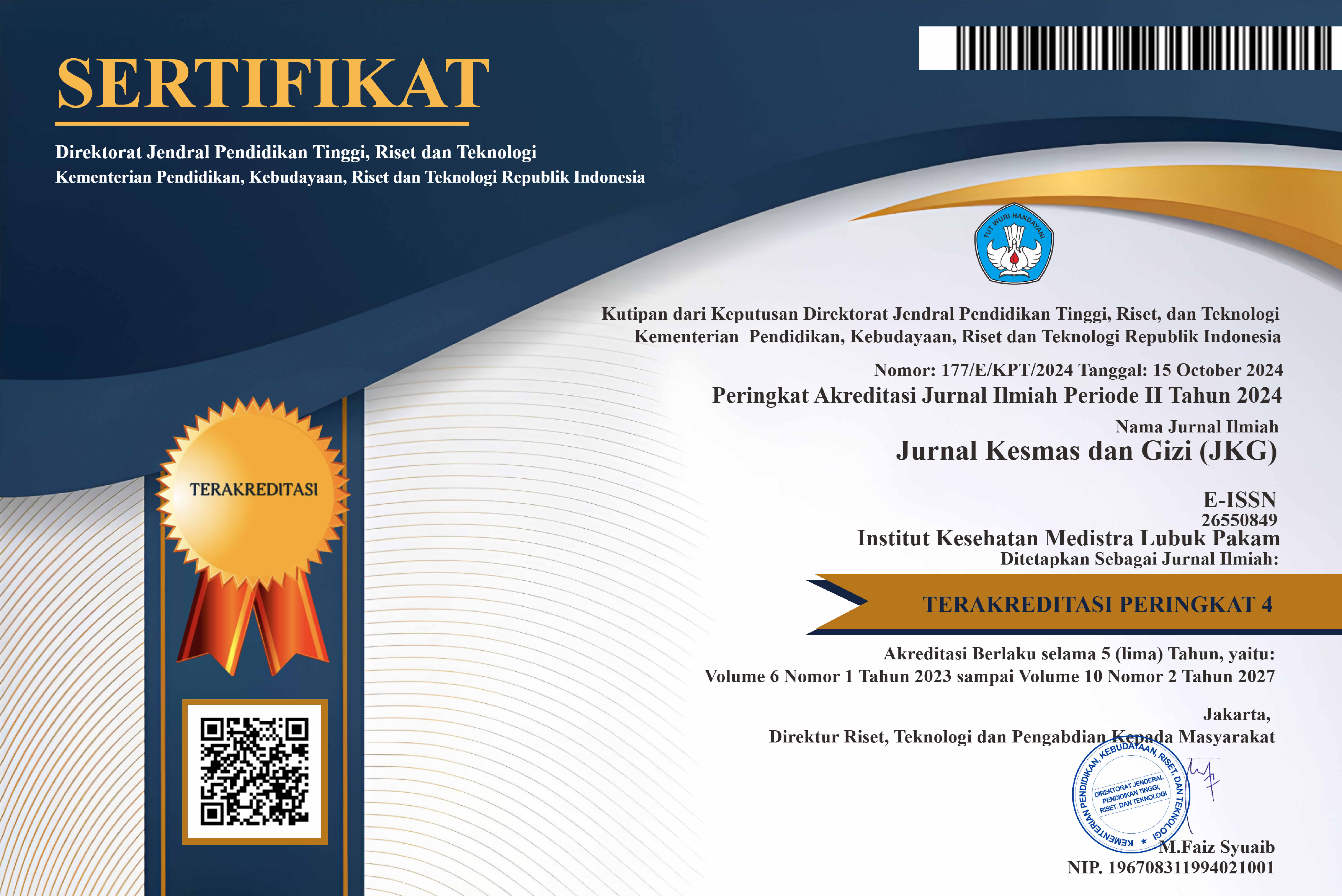An Analysis of the Impact of Implementing Ministry of Health Regulation No. 24 of 2022 on Medical Records on the Quality of Healthcare Services
DOI:
https://doi.org/10.35451/1xwq0v03Keywords:
Ministry of Health Regulation No. 24 of 2022, Medical Records, Healthcare Quality.CenterAbstract
Background: Healthcare quality is a key indicator in assessing the performance of health systems worldwide, and medical record management plays a crucial role in achieving high-quality healthcare. Objective: This study aims to analyze the impact of the implementation of Ministry of Health Regulation No. 24 of 2022 on medical records on healthcare quality. Research Methods: This study employs a cross-sectional design with a sample of 120 healthcare workers. Data were collected through questionnaires and medical record audits, then analyzed using univariate analysis for data description and bivariate analysis with Chi-Square. Results: Most respondents at RS Grandmed Lubuk Pakam were aware of Ministry of Health Regulation No. 24 of 2022 (85%), but only 72% felt its implementation was effective. Healthcare quality was generally satisfactory (83.3%), though there were some errors in medical records (11.7%). The analysis revealed a significant relationship between the implementation of the regulation and healthcare quality (? = 0.478, p = 0.002). Training for healthcare workers and available infrastructure had a significant impact on healthcare quality, while work experience did not. Conclusion: The implementation of Ministry of Health Regulation No. 24 of 2022 at RS Grandmed Lubuk Pakam has a positive impact on healthcare quality, despite challenges related to infrastructure and training. The policy has improved patient satisfaction but requires further improvements in facilities, training, and time management for greater effectiveness. Routine evaluation is necessary to ensure the continued enhancement of healthcare quality.
Downloads
References
World Health Organization. Quality of care: a process for making strategic choices in health systems. Geneva: WHO; 2006.
Menachemi N, Collum TH. Benefits and drawbacks of electronic health record systems. Risk Manag Healthc Policy. 2011;4:47–55.
Sinsky CA, Beasley JW. Texting while doctoring: a patient safety hazard. Ann Intern Med. 2013;159(11):782–783.
Kruse CS, Stein A, Thomas H, Kaur H. The use of Electronic Health Records to Support Population Health: A Systematic Review of the Literature. J Med Syst. 2018;42(11):214.
Campanella P, Lovato E, Marone C, Fallacara L, Mancuso A, Ricciardi W, et al. The impact of electronic health records on healthcare quality: a systematic review and meta-analysis. Eur J Public Health. 2016;26(1):60–64.
Nguyen L, Bellucci E, Nguyen LT. Electronic health records implementation: an evaluation of information system impact and contingency factors. Int J Med Inform. 2014;83(11):779–796.
Badan Penelitian dan Pengembangan Kesehatan Kementerian Kesehatan RI. Laporan Nasional Riskesdas 2018. Jakarta: Balitbangkes; 2019.
Cresswell KM, Sheikh A. Organizational issues in the implementation and adoption of health information technology innovations: an interpretative review. Int J Med Inform. 2013;82(5):e73–e86.
Boonstra A, Versluis A, Vos JFJ. Implementing electronic health records in hospitals: a systematic literature review. BMC Health Serv Res. 2014;14:370.
McGinn CA, Grenier S, Duplantie J, Shaw N, Sicotte C, Mathieu L, et al. Comparison of user groups' perspectives of barriers and facilitators to implementing electronic health records: a systematic review. BMC Med. 2011;9:46.
Kementerian Kesehatan Republik Indonesia. Peraturan Menteri Kesehatan Republik Indonesia Nomor 24 Tahun 2022 tentang Rekam Medis. Jakarta: Kemenkes RI; 2022.
Alkureishi MA, Lee WW, Lyons M, Press VG, Imam S, Nkansah-Amankra A, et al. Impact of Electronic Medical Record Use on the Patient-Doctor Relationship and Communication: A Systematic Review. J Gen Intern Med. 2016;31(5):548–560.
Nguyen L, Bellucci E, Nguyen LT. Electronic health records implementation: an evaluation of information system impact and contingency factors. Int J Med Inform. 2014;83(11):779–796.
Boonstra A, Versluis A, Vos JFJ. Implementing electronic health records in hospitals: a systematic literature review. BMC Health Serv Res. 2014;14:370.
Ministry of Health of the Republic of Indonesia. (2022). Regulation of the Minister of Health of the Republic of Indonesia No. 24 of 2022 on Medical Records. Jakarta: Ministry of Health of the Republic of Indonesia.
Cummings, G., MacGregor, T., & Davey, M. (2017). The role of nurses in implementing health policy: A systematic review. Journal of Nursing Administration, 47(5), 245-251.
Anderson, R., & Rogers, P. (2020). The impact of education on healthcare policy implementation. Health Policy Journal, 5(4), 50-56.
Grol, R., & Wensing, M. (2018). Implementation of evidence-based practice: A systematic review of strategies. Journal of Implementation Science, 13(1), 115-124.
Nugroho, M., & Salim, A. (2020). Effective communication in policy implementation: A case study. Journal of Healthcare Policy, 22(3), 110-119.
Sari, L., & Purnama, D. (2021). The influence of healthcare infrastructure on policy implementation. International Journal of Public Health, 18(2), 60-65.
Lestari, E., & Suhartini, R. (2020). Training as a key factor in successful health policy implementation. Journal of Health Education, 9(2), 130-135.
Sulaiman, A., & Harun, I. (2020). Patient satisfaction and healthcare service delivery. Healthcare Management Journal, 12(1), 78-85.
Tan, R., & Yulianto, P. (2021). Medical record errors and its impact on patient safety: A review. International Journal of Medical Records, 9(4), 35-40.
Purwanto, A., & Suprianto, B. (2021). Time management in healthcare: Implications for service quality. Journal of Health Time Management, 7(2), 92-98.
Gozali, F., & Kusumawati, D. (2021). The effect of electronic health records on patient satisfaction. Journal of Health Informatics, 19(3), 74-81.
Kumar, R., & Agarwal, S. (2020). Electronic health records and their impact on healthcare quality. Healthcare Information Systems Journal, 14(2), 27-34.
Niken, S., & Fajri, H. (2020). Enhancing medical record management in Indonesian hospitals: The role of training. Indonesian Journal of Health Services, 8(4), 112-118.
Downloads
Published
Issue
Section
License
Copyright (c) 2025 Balqis Wasliati

This work is licensed under a Creative Commons Attribution 4.0 International License.
Copyright in each article is the property of the Author.



























